The VECTASTAIN ABC Reagent can be used to detect any biotinylated molecule. This is the original avidin/biotin ABC complex formation without a biotinylated secondary antibody.
| Unit Size | 1 kit |
|---|---|
| Applications | Immunohistochemistry / Immunocytochemistry, Elispot, ELISAs |
| Technology | ABC (Avidin/Biotin) Systems |
| Detection Enzyme(s) | Peroxidase |
| Target Species | No antibody included |
| Format | Concentrate |
We offer a choice of either peroxidase or alkaline phosphatase based VECTASTAIN ABC kit detection systems. Selection of which enzyme system to use would be the first step. Most IHC applications involve detecting an unconjugated primary antibody. Consider the species in which the primary antibody is raised (e.g. rabbit), and then match to to corresponding species-specific VECTASTAIN ABC kit (e.g. VECTASTAIN ABC Rabbit IgG kit). If you already have a biotinylated target (i.e. biotinylated secondary antibody or primary antibody), then a standard VECTASTAIN ABC kit containing just the avidin/biotinylated enzyme reagents would be required. Note that only the VECTASTAIN Universal Elite PLUS ABC kit (PK-8200) contains a substrate.
We do not recommend freezing the ABC kits. In particular, the ABC reagents exhibit a decrease in enzyme activity and lose some sensitivity when stored at – 20 °C for extended periods.
Product review on Biocompare.com.
The VECTASTAIN ABC systems are extremely sensitive due to the form and number of active enzyme molecules associated with the preformed Avidin/Biotinylated enzyme Complex. This ABC complex takes advantage of two important properties of avidin: 1) an extraordinarily high affinity for biotin (over one million times higher than antibody for most antigens), and 2) four biotin-binding sites. These properties allow macromolecular complexes (ABCs) to be formed by mixing Avidin DH (Reagent A) with its paired biotinylated enzyme (Reagent B) prior to use. The ABC reagent, once formed, remains stable for many hours after formation and can be used for several days after preparation.
Biotinylated primary antibodies, secondaries, lectins, neuronal tracers, nucleic acids, and ligands can be effectively visualized in applications such as:
All applications benefit from the high sensitivity, low background, reproducibility, and economy of the VECTASTAIN ABC system.
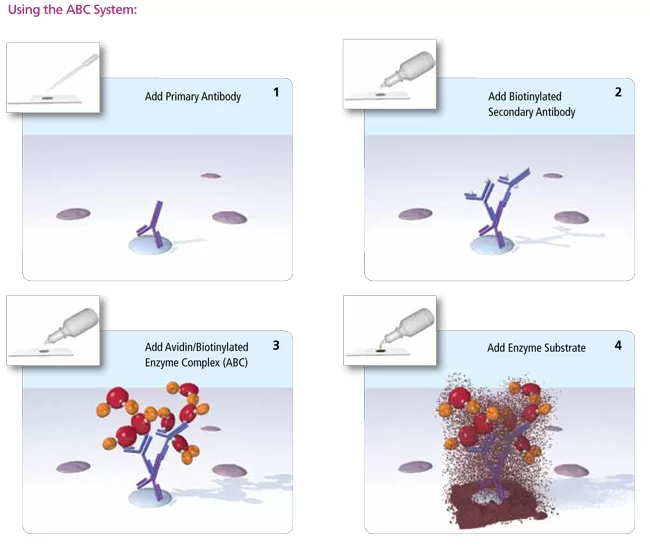
The VECTASTAIN ABC Kits are available with a choice of two different enzyme systems
To detect a biotinylated target, you will need only the ABC Reagent contained in the Standard Kit, followed by an appropriate substrate.
To detect an unlabeled primary antibody, you will need a biotinylated secondary antibody that binds to the primary antibody species chosen, the ABC Reagent, and an appropriate substrate. For example, to detect a primary antibody made in rabbit, the appropriate choice is a VECTASTAIN ABC Kit designated “Rabbit IgG”.
For additional versatility and convenience, Vector Laboratories offers secondary antibody products that recognize more than one species of primary antibody. Our Universal Biotinylated Anti-Mouse/Rabbit IgG secondary antibody (Cat. No. BA-1400) is a cocktail of biotinylated anti-mouse IgG and anti-rabbit IgG, designed for use with both rabbit and mouse primary antibodies. This antibody should not be used to stain tissues from rodents or rabbits due to its reactivity with IgG present in the tissues of these species. The Universal Pan-Specific Anti- Mouse/Rabbit/Goat secondary antibody (Cat. No. BA-1300) (which is included in our VECTASTAIN Universal Kits) is a cocktail of biotinylated anti-mouse IgG, anti-rabbit IgG, and anti-goat IgG that recognizes mouse, rabbit, and goat primary antibodies. This secondary antibody should not be used to stain rat, mouse, or other rodent, rabbit, goat, bovine, or sheep tissue due to potential reactivity with endogenous IgG.
Finally, several kits are available in prediluted, stabilized formats for convenience and ease of use. See kits designated R.T.U. or Ready-To-Use.
When choosing the optimal detection system for your application, it is important to consider not only the species of the primary antibody but also the species of the tissue under examination. If the species of the primary antibody and the species of the tissue are closely related (e.g. rat and mouse), the biotinylated secondary antibody may cross react with endogenous IgG in the tissue section leading to background staining. The following three options minimize background staining in these instances:
After choosing the VECTASTAIN ABC Kit for your application, select a substrate that matches the enzyme system of the kit.
Applicable patents and legal notices are available at legal notices.
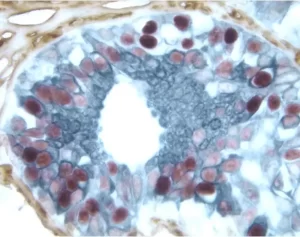
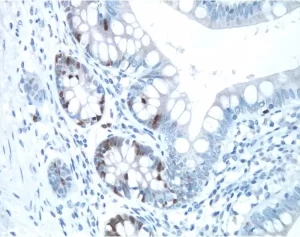
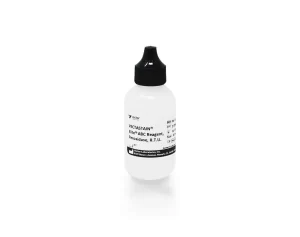
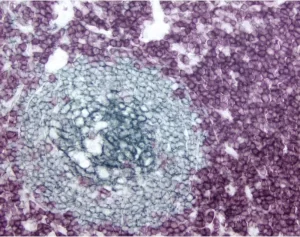
Stay in the Loop. Join Our Online Community
Products
Ordering
About Us
Application
Resources
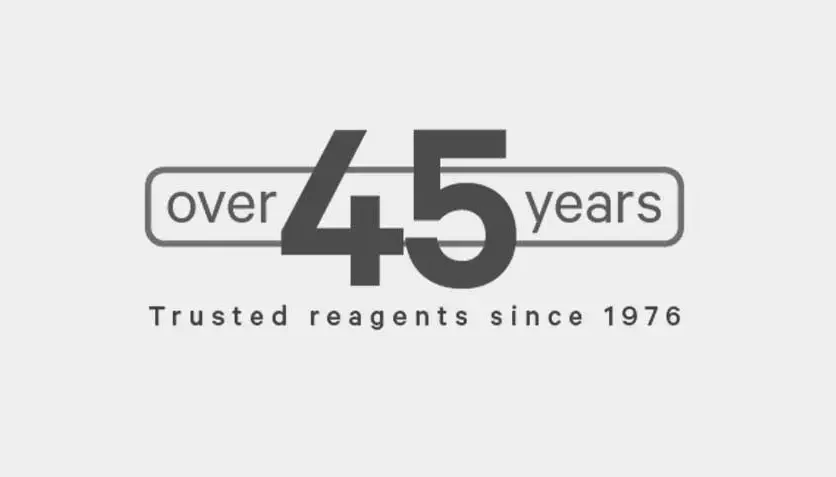
©Vector Laboratories, Inc. 2025 All Rights Reserved.
To provide the best experiences, we use technologies like cookies to store and/or access device information. Consenting to these technologies will allow us to process data such as browsing behavior or unique IDs on this site. Not consenting or withdrawing consent, may adversely affect certain features and functions. Privacy Statement
How do I Request a Quote?
To request a quote for products: